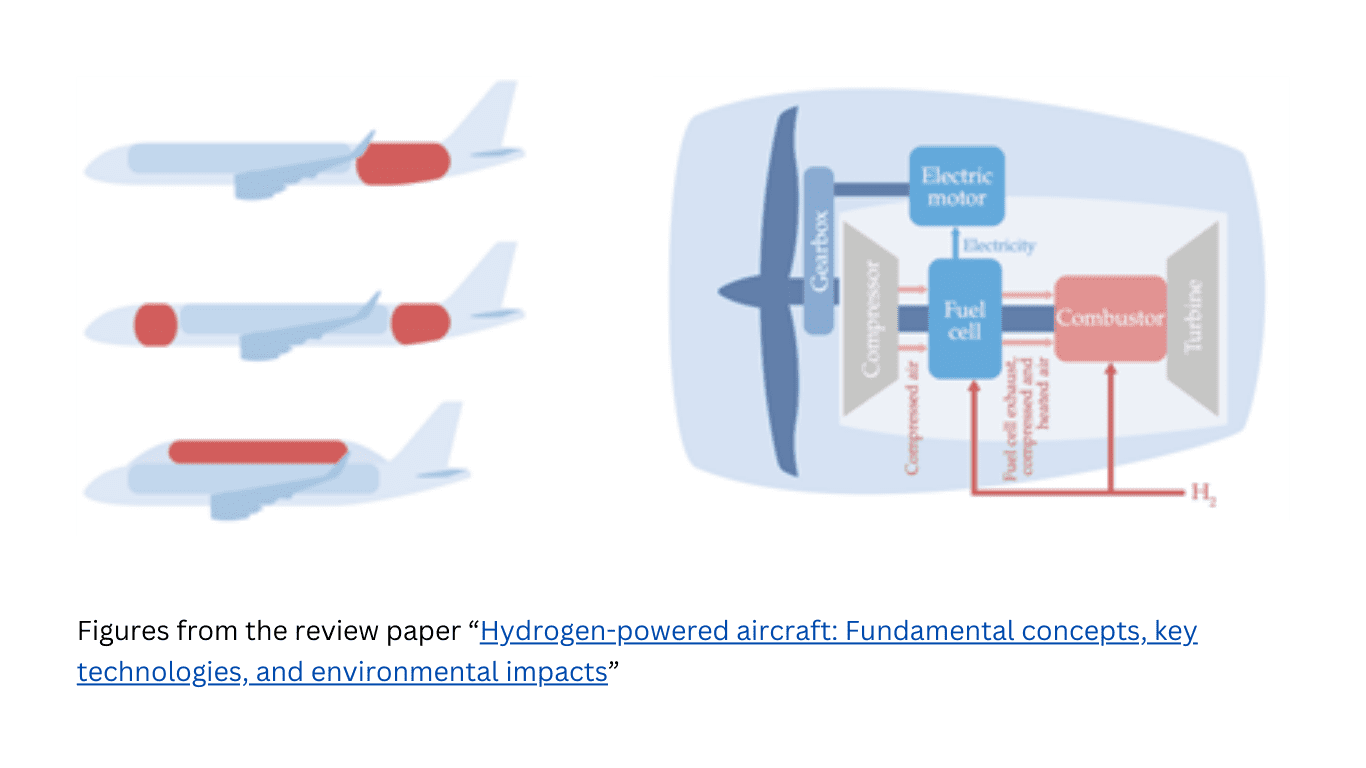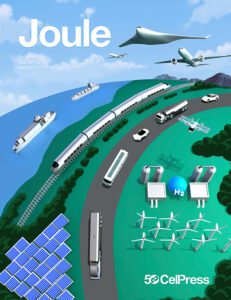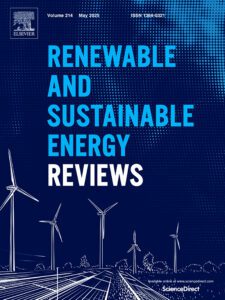

About MI Hydrogen
U-M Hydrogen Expertise
Faculty Spotlight
Advisory Board
News
Events
Research Projects
Partnerships & Connections
Contact Us
About MI Hydrogen
MI Hydrogen launched a set of four projects in 2023 that included critical reviews of hydrogen’s role in sustainable transportation (e.g., heavy trucks, buses, rail, ships and aviation) and in the decarbonization of the industrial sector (e.g., chemicals, steel, glass, cement, semiconductor manufacturing), a state of Michigan hydrogen demand analysis, and a framework for hydrogen ecosystem planning and deployment. The first three project findings have been published.
MI Hydrogen faculty play a key role in the Midwest Alliance for Clean Hydrogen (MACH H2) Hub which is one of seven Regional Clean Hydrogen Hubs selected for funding by the US DOE. Our partnership includes leadership of the MACH H2 advisory board, life cycle assessment and techno-economic analysis, and workforce development and community engagement. MI Hydrogen is leveraging this partnership to catalyze academic research to support future hydrogen technology innovation, demonstration, and scale-up.
MI Hydrogen is engaging with a variety of dozens of industries and government agencies/labs such as Ford Motor Company, General Motors, Toyota, American Center for Mobility, Constellation, DTE Energy, Mitsubishi Power, Guardian Glass, Hemlock Semiconductor; and the State of Michigan (Office of Infrastructure, Department of Transportation), and national labs (Argonne National Lab, Idaho National Lab, Oak Ridge National Lab).
Faculty involved in MI Hydrogen are also part of the U.S. Nuclear Hydrogen Initiative, aimed at using current and advanced reactors including SMRs to make zero-carbon hydrogen for transportation and industry. MI Hydrogen has a leadership role in the New Hydrogen Engine Alliance of North America and is seeking to create a hydrogen internal combustion engine and fuel cell testing facility. MI Hydrogen organizes regular seminars and workshops and has been instrumental in creating a network of practitioners and stakeholders spanning hydrogen production, delivery, storage and end-use applications in the State, the Great Lakes region and beyond. MI Hydrogen supports hydrogen curriculum development and training and case competitions.
MI Hydrogen is a joint venture by the Office of the Vice President for Research, Michigan Engineering and the School for Environment and Sustainability. Professors Todd Allen and Greg Keoleian, who have extensive research experience in fields ranging from nuclear engineering to sustainable systems, serve as co-directors.

Todd Allen

Greg Keoleian
Allen and Keoleian recently convened a series of visioning sessions with faculty engaged in the hydrogen space to solicit feedback regarding ways in which U-M can help accelerate clean and just energy transitions. The initiative builds upon the Hydrogen Roadmap for the State of Michigan Workshop hosted last spring at U-M, which brought together stakeholders from academia, industry and government, and led to a report published by the Center for Sustainable Systems, a lead collaborator of MI Hydrogen.
Based on community input around the proposed design and direction for the initiative, MI Hydrogen will launch with a set of new research projects focused on transportation and industrial applications. Hydrogen is primarily used nowadays in the chemical and petroleum refining industries.
Teams also will analyze the potential statewide demand for hydrogen, and develop a framework for hydrogen ecosystem planning and implementation. A majority of hydrogen production in the United States and abroad is generated from steam methane reforming of natural gas, which is problematic from a climate change perspective.
The potential for hydrogen to serve as a clean, economical energy carrier has generated increased momentum federally, highlighted by a recent commitment from the Department of Energy to invest $7 billion toward the creation of six to 10 regional hubs designed to accelerate the deployment of hydrogen across the U.S.

Faculty Spotlight
This Month’s Spotlight
Brian Ellis: Geologic Storage, Permeability Evolution
 Brian Ellis, associate professor of civil and environmental engineering, returned to the University of Michigan in 2012 as a Michigan Society Fellow and later joined the CEE department faculty in 2014. His involvement with MI Hydrogen began in January 2024 when one of his PhD students became interested in the topic. This sparked Ellis’ growing interest in subsurface H2 storage.
Brian Ellis, associate professor of civil and environmental engineering, returned to the University of Michigan in 2012 as a Michigan Society Fellow and later joined the CEE department faculty in 2014. His involvement with MI Hydrogen began in January 2024 when one of his PhD students became interested in the topic. This sparked Ellis’ growing interest in subsurface H2 storage.
His research career started as an undergraduate student at U-M working with Professor Clara Castro, Professor of Earth and Environmental Sciences. Together, they studied noble gas geochemistry in producing oil and gas brines from across Michigan’s Lower Peninsula. This experience inspired Ellis to shift his focus to Environmental Engineering for his graduate studies.
“The switch to engineering was the most pivotal moment in my research path,” Ellis explained. “It happened somewhat by circumstance and through the advice of my mentor, Professor Castro, who recommended I apply to Princeton.”
Castro’s encouragement led Ellis to discover the research of his eventual PhD advisor, Catherine Peters, a U-M alumna and professor of Civil and Environmental Engineering with a courtesy appointment in Geology at Princeton. Unaware of how courtesy appointments function, Ellis initially applied to the Princeton Geosciences department in order to work with Peters.
“That was not a recipe for successful admission,” Ellis recalled. “Professor Peters ultimately had to walk over to the geosciences department to find my application and asked to have it transferred to engineering. That is how I ended up as a geochemist in Civil and Environmental Engineering. It has been a great home for my research interests.”
At Princeton, he began working on geologic CO2 storage, which was an emerging research area in 2006. Today, he researches how underground rock formations can support low-carbon energy solutions. His group examines water-rock interactions in deep geologic reservoirs and how these interactions affect fluid transport during energy production and gas storage. With extensive experience in studying geologic CO2 storage, Ellis has a strong research interest in exploring how the subsurface can be utilized to enable low-carbon energy technologies. Subsurface hydrogen storage fits squarely in this space. He is investigating how the unique geology of the Michigan Basin could be leveraged to support subsurface hydrogen storage, particularly through storage in engineered caverns in bedded salt formations.
His research has since expanded to also explore the potential for geologic hydrogen production, known as white H2. He plans to begin experimental work on this topic in the summer of 2025, with the aim of understanding the conditions, such as temperature, pressure and fluid chemistry, needed to optimize hydrogen production in combination with CO2 sequestration.
“I still remember a discussion I had with a mentor of mine at Princeton named Rob Socolow.” Ellis recalled, “He told me there is no silver bullet to solving the global carbon imbalance. Instead, we need a silver buckshot approach—that is, we need a portfolio of solutions. I believe that hydrogen is a necessary component in this low-carbon energy solutions portfolio.”
Topical Areas of Interest: Geologic Storage, Permeability Evolution
| Ellis holds a B.S. in both Geology and Economics from the University of Michigan (2006), an M.A (2009) and Ph.D. (2012) in Civil and Environmental Engineering from Princeton University. He received the CAREER Award from the National Science Foundation (2020) and the CEE Faculty Excellence Award from the University of Michigan College of Engineering (2019). He participated in the National Academy of Engineering US Frontiers of Engineering Symposium (2018) and was a NSF Science, Engineering and Education for Sustainability Fellow (2012–2016). Ellis earned the Doctoral New Investigator award from the American Chemical Society Petroleum Research Fund (2015). He is a member of the Association of Environmental Engineering and Science Professors, the American Geophysical Union, the American Chemical Society and InterPore. |
Past Spotlights
André Boehman: Combustion, Emissions, Emissions Control, Renewable Fuels, Alternative Fuels
 André Boehman joined the University of Michigan Department of Mechanical Engineering in 2012, after serving for 18 years at the Pennsylvania State University. He also currently serves as the director of the renowned Walter E. Lay Automotive Engineering Laboratory, conducting automotive research centered around engine, battery, powertrain and vehicle autonomy.
André Boehman joined the University of Michigan Department of Mechanical Engineering in 2012, after serving for 18 years at the Pennsylvania State University. He also currently serves as the director of the renowned Walter E. Lay Automotive Engineering Laboratory, conducting automotive research centered around engine, battery, powertrain and vehicle autonomy.
In 2023, Boehman was appointed the Vennema Professor of Engineering, an endowed professorship supporting scholars whose work will impact the technologies of tomorrow. With over 26 years of experience in hydrogen research, Boehman has been lending his expertise to the MI Hydrogen initiative since its inception.
Boehman’s interest in automotive emissions control began in childhood while helping his father (a professor of mechanical engineering at the University of Dayton) to do tailpipe exhaust measurements as a public service in the early 1970’s. As a graduate student at Stanford University and postdoc at SRI International, Boehman studied heat and mass transfer issues in automotive catalytic converters. In 1994, he joined the Fuel Science Program at Penn State, focusing on fuel processing catalysis, coal-based jet fuel formulation, diesel combustion, diesel emissions, diesel emissions control and alternative fuels.
Early in his career at Penn State, he began collaborating with Air Products and Chemicals, Inc., prominent for its work in the widespread generation and distribution of hydrogen. Air Products’ interest in the production of synthetic fuels led to multiple collaborations with Boehman, including the conversion of a Penn State campus shuttle bus to operate on dimethyl ether. In addition, the collaboration with Air Products led to research on the application of hydrogen in internal combustion engines.
Throughout his career, his work has maintained a consistent theme of alternative and reformulated fuels, and combustion and pollution control. When the MI Hydrogen initiative launched, Boehman was eager to get involved.
Key objectives of MI Hydrogen include determining how to generate hydrogen and how to best use it. Boehman’s group concentrates on uncovering the most impactful ways to use hydrogen to produce fuel, as well as to determine how hydrogen can work in concert with other fuels to operate an engine. The innovative work led by Boehman greatly contributes to the MI Hydrogen initiative and the U-M research community.
Topical Areas of Interest: combustion, emissions, emissions control, renewable fuels, alternative fuels
| Boehman holds a B.S. in mechanical engineering from the University of Dayton (1986) and an M.S. (1987) and Ph.D. (1993) in mechanical engineering from Stanford University. He held a two-year postdoctoral fellowship in the Molecular Physics Laboratory at SRI International, in Menlo Park, CA. He was elected a Fellow of the Society of Automotive Engineers (2012), of the American Chemical Society (2019), the American Society of Mechanical Engineers (2019) and a Fellow of the Combustion Institute (2022). He has been awarded the John Johnson Award for Outstanding Research in Diesel Engines, the Arch T. Colwell Merit Award from the Society of Automotive Engineers, the Alumni Achievement Award from the University of Dayton School of Engineering (1999), and the Internal Combustion Engines Award (2020) and the Charles T. Main Bronze Medal(1986) from the American Society of Mechanical Engineers. |
Rohini Bala Chandran: Thermal and Fluid Sciences; Multiscale Computational Model, Chemical Kinetics of Heterogeneous Reactions; Renewable Production

Rohini Bala Chandran joined the University of Michigan’s Department of Mechanical Engineering in 2018 as an assistant professor, after spending two years as a postdoctoral researcher in the Energy Storage & Distributed Resources division at the Lawrence Berkeley National Laboratory.
Bala Chandran leads the TREE Lab, which offers unique expertise at the intersection of thermal and chemical sciences to enable efficient energy and chemical transformations. This work has applications in many interdisciplinary areas, including the design and testing of concentrated solar thermal receivers and reactors, heat exchangers, thermochemical and photocatalytic solar-fuel generators and electrochemical flow cells targeting carbon removal and commodity chemical production.
“Our approach is to develop computational models integrated with experimental analyses to probe the interplay of heat and mass transfer, fluid flow and chemical reactions that play a central role in various thermal, thermochemical and electrochemical energy systems,” Bala Chandran explains.
Bala Chandran is also a Thrust Co-Lead at Ensembles of Photosynthetic Nanoreactors, a multidisciplinary, DOE-funded Energy Frontier Research Center (EFRC) led by UC Irvine. The center focuses on advancing the fundamental understanding of photocatalytic materials and reactors for solar-to-chemical transformations. Their concerted efforts, supported by the EFRC, is yielding rapid insights into how these materials function across different length and time scales and how this knowledge can be leveraged to boost solar-to-fuel efficiencies. Previously, her group’s research on photocatalytic solar hydrogen production was funded by the Department of Energy Fuel Cell Technologies Office.
In the domain of solar-to-heat, Bala Chandran’s team investigates new heat-transfer and thermal storage media for concentrated solar power. This involves magnifying incident sunlight by at least a factor of 1000 compared to peak incident solar power on a clear-sky day. Such enhancement allows systems to harness solar energy to attain high temperatures between 600 and 1,000 degrees Celsius and drive power cycles for electricity generation. These high temperatures have numerous applications, including the study of materials characterization. Additionally, her research involves designing thermal systems for thermal energy storage and various other applications.
Bala Chandran’s research on solar and renewable electricity for the production of fuels and commodity chemicals intersects with her involvement in MI Hydrogen. In one of her projects, her team uses sunlight to split water and produce hydrogen. A promising approach involves using low-cost, water-stable metal oxide semiconductor materials as light absorbers to drive photocatalytic reactions. However, photocatalytic systems pose a unique challenge due to the close proximity of sites where the anodic and the cathodic reactions occur, leading to low reaction selectivity where undesired chemical reactions occur alongside the desired ones, resulting in low energy conversion efficiencies.
In a recent paper featured in Energy & Environmental Science, Bala Chandran’s research group demonstrates ways to manipulate the mass transport of chemical species, such as the use of selective coatings on materials and/or modifications to reactor designs. Despite significant progress in identification and discovering many efficient materials for solar water splitting, there remains a need for innovation in integrated materials and reactor designs, particularly focusing on cost, scalability and durability. “There’s a significant knowledge gap in good reactor designs for these photocatalytic particle-based systems,” Bala Chandran said, “which have tremendous potential to lower costs for hydrogen production.”
Within MI Hydrogen, Bala Chandran currently collaborates with Nirala Singh, coupling Singh’s catalysis expertise with her expertise in reactor design and modeling to enable circular fuels and fertilizer production. “We’re really good at understanding how the physical phenomena in any system work, especially when multiple factors like flow, heat transfer and chemical reactions converge,” Bala Chandran said. “We have many tools in our group to model all these coupled physical processes, and what is notable is that we actively connect models with experimental design-build-test activities to assess how materials perform in reactors. Additionally, we can assess how much further we can advance the performance by innovating the reactor designs.”
Topical Areas of Interest: Thermal and Fluid Sciences; Multiscale Computational Model, Chemical Kinetics of Heterogeneous Reactions; Renewable Production
| Bala Chandran holds a BS in Mechanical Engineering (2009) from the Birla Institute of Technology and Science (BITS-Pilani), India (2008), an MS (2010) and a PhD (2015) in Mechanical Engineering from the University of Minnesota, Twin Cities. She received the ASME Bergles-Rohsenow Young Investigator Award in Heat Transfer (2023), the NSF Career Award for study of radiative transport (2022), the Doctoral New Investigator (DNI) award from the American Chemical Society Petroleum Research Fund, ACS-PRF (2021) and a Doctoral Dissertation Fellowship at the University of Minnesota (2014–2015). |
Daniel Cooper: Industrial Decarbonization, Metals Processing, Decarbonization
 Daniel Cooper joined the University of Michigan in 2017 as an assistant professor in mechanical engineering. Now a tenured associate professor, Cooper’s research focuses on sustainable manufacturing and material flows aiming for deep decarbonization in industries that are traditionally challenging to decarbonize. Recognizing the potential role of hydrogen in this effort, Cooper was motivated to get involved in the MI Hydrogen initiative.
Daniel Cooper joined the University of Michigan in 2017 as an assistant professor in mechanical engineering. Now a tenured associate professor, Cooper’s research focuses on sustainable manufacturing and material flows aiming for deep decarbonization in industries that are traditionally challenging to decarbonize. Recognizing the potential role of hydrogen in this effort, Cooper was motivated to get involved in the MI Hydrogen initiative.
Heavily invested in manufacturing education, Cooper serves as chair of the manufacturing concentration in mechanical engineering, a program not exclusive to mechanical engineering majors. He is also the director of the Resourceful Manufacturing and Design (ReMaDe) group, which seeks to empower US manufacturers to achieve sustainability through design, process and supply chain innovations. ReMaDE also promotes an innovative and diverse design and manufacturing workforce.
Cooper’s research examines greenhouse gas emissions during material production and processing. His work with MI Hydrogen involves exploring hydrogen’s role in specific industries. His latest project aims to examine how to achieve deep decarbonization in the US automotive aluminum and steel industries.
During his first year with MI Hydrogen, Cooper contributed to a comprehensive review paper exploring hydrogen’s role in industry. This work has laid a firm foundation for directing resources appropriately.
“We are trying to understand the potential for hydrogen to decarbonize US industry at that macro level,” Cooper explains. “From there, we are trying to understand those challenges in a bit more detail, so that we can direct research to the most fruitful potential areas.”
In his research, Cooper has identified several decarbonization strategies. First, circular economy emphasizes material efficiency, reuse and recycling to reduce emissions. However, this alone is not sufficient to achieve deep decarbonization.
Increased electrification, provided it is based on renewable energy, offers another effective solution for reducing emissions. Nevertheless, certain industries that require high-temperature processes, such as iron making, cement manufacturing and metal heat treatments are difficult to electrify due to temperatures exceeding 1,000 degrees Celsius.
In these high-temperature processes, hydrogen’s high specific energy per unit mass enables it to burn extremely hot, providing it with the potential to replace natural gas currently used in furnaces.
Another potential avenue for the use of hydrogen is its replacement in chemical reactions that explicitly produce carbon dioxide. For example, in the production of iron, separating iron from oxygen produces CO2. By replacing carbon with hydrogen in steelmaking, the hydrogen can remove the oxygen from the iron, with water as the main byproduct.
Despite its potential, the generation and transportation of hydrogen continues to present significant challenges. Current production methods such as steam methane reforming, emit significant amounts of carbon dioxide. Additionally, hydrogen can cause steel to become brittle, complicating pipeline transportation. MI Hydrogen aims to address these challenges, developing sustainable solutions.
“The greenhouse gas emissions released from making materials and then processing them into products have to be reduced if we’re going to avoid the worst consequences of climate change,” Cooper warns. “My research focuses on how we can do that.”
Topical Areas of Interest: industrial decarbonization, metals processing, decarbonization
| Cooper holds a Bachelor of Mechanical Engineering (2008), a Master of Mechanical Engineering (2009) and a PhD (2013) in Engineering from the University of Cambridge. He conducted his post-doctoral research in the Laboratory for Manufacturing Productivity at the Massachusetts Institute of Technology. He was awarded the ASME Ben C. Sparks Education Medal and the SME Outstanding Young Manufacturing Engineer Award in 2020. In 2022, Cooper received the highly competitive ASME McDonald Mentoring Award “for pioneering leadership in sustainable manufacturing research and for initiating multiple programs and practices for mentoring University of Michigan students and underrepresented minorities in the community.” |
Mirko Gamba: Combustion Science, Safety, Sensing and Diagnostics, Energy Conversion Systems, Emissions

Mirko Gamba joined the University of Michigan’s Aerospace Engineering Department as an assistant professor in 2012, following a three-year postdoctoral position at Stanford University. In 2018, he advanced to associate professor and currently leads the Gas Dynamics Imaging Laboratory. Gamba has served as chair of the graduate department and in 2019, joined the University of Michigan Space Institute executive committee where he focuses on coordinating outward-facing events with external partners.
Gamba’s research focuses on energy conversion and propulsion systems, specifically for sustainable aviation. “The MI hydrogen program is connected to the broad topic of sustainability,” Gamba explains. “The initiative and the research areas span every step of the hydrogen process, from production to utilization, including storing, transporting and managing. My research focuses on the end of this chain.”
His research spans two main areas. The first involves developing and applying new or adapted measurement techniques for reacting flow. These optical-based techniques use lasers and cameras to measure the state of the system, which typically involves a gas undergoing flow evolution or a chemical reaction inside a combustion engine or gas turbine.
The second area examines fundamental aspects of novel energy conversion technologies. Typically, these conversions involve chemical reactions to produce useful energy for power generation or propulsion in aviation. Gamba’s group exploits specific processes to increase system output, thereby improving overall performance and efficiency, resulting in more compact systems.
Hydrogen is of particular interest due to its energy density, which is sufficient to propel a vehicle in flight. However, it also presents challenges. While its energy density is high per unit mass, hydrogen’s energy density is lower per unit volume, making storage an obstacle. Efficient storage typically requires hydrogen to be compressed or cryogenically cooled, complicating its integration into existing systems designed for denser liquid fuels. Consequently, current aircraft designs using liquid fuels, such as kerosene, must be redesigned to accommodate the use of hydrogen.
Moreover, reacting flow systems can exhibit instabilities that prevent processes from occurring, causing combustors to shut down. There are also concerns related to safety, flashback instabilities and high flame speeds that limit their application in standard configurations and necessitate recalibration of devices.
“Even though we are at the end of the chain, we have to integrate our work with everything that happens upstream of it,” said Gamba. “It’s not just about burning hydrogen. It is about managing the hydrogen from the time you load it onto the aircraft to the way you consume it. Even ground operations will need to change.”
Through his research, Gamba aims to address these challenges and unlock the potential of hydrogen use in aviation, contributing to a more sustainable and efficient future for the industry.
Topical Areas of Interest: Combustion Science, Safety, Sensing and Diagnostics, Energy Conversion Systems, Emissions
| Gamba holds a Laurea in Mechanical E Engineering (2003) from the Politecnico di Milano, in Milano, Italy, an MSE in Mechanical Engineering (2002) and a PhD in Aerospace Engineering (2009) from the University of Texas at Austin. He received the Ted Kennedy Family Faculty Team Excellence Award for 2020-2021. He was awarded the ENI Fellowship in Mechanical Engineering, Politecnico di Milano, Italy, 2000-2002 and the AFOSR Young Investigator Award in 2014. Gamba was elected to the grade of Associate Fellow-Class of 2022 in the American Institute of Aeronautics and Astronautics and was a US Air Force Summer Faculty Fellow in 2014 and 2015. He is a member of the American Physical Society – Division of Fluid Dynamics and The Michigan Institute for Plasma Science and Engineering (MIPSE). |
Joshua Jack: Waste to Energy, Decarbonization

Joshua Jack, assistant professor of civil and environmental engineering, joined the University of Michigan in 2022.
“I am a recent addition to the MI Hydrogen community,” Jack said, “and have been involved for less than a year. I am relatively new to U-M, so I was excited to learn that we have an institute focused on hydrogen. I believe economic and efficient hydrogen synthesis, transport, and utilization are paramount to the future energy and chemical sectors, so I am thrilled to participate in this initiative.”
Jack has always been interested in energy and the environment and was fortunate to have the opportunity to conduct the majority of his dissertation research at the DOE-National Renewable Energy Lab. Being surrounded by top-notch scientists pushing the limits of electrification and decarbonization really motivated him to pursue a research-oriented career where he could consider new ways to harness the power of renewable electrons for environmental, energy and chemical applications. He is particularly grateful to his Ph.D. advisor, Zhiyong Jason Ren, now at Princeton University, for teaching him so many important lessons and helping shape his perspective as a researcher.
Jack is head of the Jack Lab and his research focuses on electrified processes, including electrochemical, bio-electrochemical and thermo-electrochemical systems. Their work spans various scales, from atomistic catalyst design to electrolyzer stack engineering. They are currently exploring several new electrified processes that aim to use abundant waste streams to drive clean hydrogen production while producing valuable co-products. These integrated devices can potentially accomplish multiple goals at once, including sustainable waste management, green chemical synthesis and energy-efficient hydrogen generation.
In his research, Jack and his team are beginning to integrate real waste streams into their devices to drive hydrogen production. However, the heterogeneity and variability of wastes, such as those found in wastewater, present significant challenges. Despite these obstacles, the team is making progress in understanding these issues and has started to evaluate key design aspects, including the stability of electrocatalysts under varied and complex waste conditions.
“It is clear,” Jack said, “that growing our hydrogen economy will be crucial to achieving societal goals such as electrification and decarbonization. Forging paths to create a hydrogen-rich world could transform how we move, harness energy and manufacture goods on a planetary scale.”
Topical Areas of Interest: Waste to Energy, Decarbonization
| Jack holds a B.Sc. (2014) and M.Sc. (2015) in Civil and Environmental Engineering from the University of Massachusetts, Amherst and a Ph.D. in Environmental Engineering from the University of Colorado, Boulder (2019). He was named an NSF GK-12 Graduate Fellow in 2016 and received the NASA Outstanding Research Contribution Award in 2017. He was named a Scialog Negative Emission Science Fellow in 2023 and ASCE ExCEED Fellow in 2024. He serves on the Early-Career Editorial Board of the American Chemical Society Applied Engineering Materials Journal. He is a member of the American Chemical Society (ACS), the Association of Environmental Engineering and Science Professors (AEESP), the Electrochemical Society (ECS), the International Water Association (IWA), the International Society of Microbial Electrochemical Technologies (ISMET), the Michigan Catalysis Society (MCS), the Michigan Materials Research Institute (MMRI) and the Water Environment Federation (WEF). He serves as a Faculty Sustainability Expert at the Graham Sustainability Institute (GSI) and is a Faculty Affiliate at the Global CO2 Initiative as well as a Faculty Affiliate at the Michigan Institute for Plasma Science and Engineering (MIPSE). |
Joaquim R. R. A. Martins: Aircraft Fuel Burn

A native of the Azores, Portugal, Joaquim R. R. A. Martins has always had an interest in aircraft. It was this interest that led him to pursue a degree in aeronautics at the Imperial College in London. He received his Ph.D. from Stanford University where he developed a more specialized interest in aircraft design optimization.
“Aviation makes the world go around,” said Martins. “It is the only way to move something or someone across the world in a day or less. It connects people, and it plays a crucial role in the economy.”
In 2002 Martins joined the University of Toronto as an associate professor. It was there that he founded the Multidisciplinary Design Optimization Laboratory (MDO Lab) research group, specializing in optimizing complex engineering systems across various disciplines to advance the design process of aerospace vehicles and other high-performance structures. Since then, he has directed his aircraft design optimization efforts toward reducing the greenhouse gas emissions caused by aviation.
Martins began his appointment at the University of Michigan in 2009, serving as a Pauline M. Sherman Collegiate Professor of Aerospace Engineering with a courtesy appointment in Naval Architecture & Marine Engineering. He also continues to lead the Multidisciplinary Design Optimization Laboratory.
Today, Martins is a leading researcher in computational methods for the design optimization of engineering systems. His innovative methods have been applied to the design of aircraft, wind turbines, hydrofoils, cars and satellites.
For over a decade, he has collaborated on projects with NASA, including in the development of OpenMDAO, an open-source platform for high-performance systems analysis and multidisciplinary optimization. The system can quickly improve the design of complex engineering systems, including aircraft and their systems.
As hydrogen research gained momentum with increased interest, Martins teamed up with his students to write a review on hydrogen-powered aircraft, exploring a range of concepts, technologies and their environmental impacts. In place of conventional fuels like kerosene, they have redesigned engines to use hydrogen and are exploring ways to use hydrogen in fuel cells for electrification.
Martins notes that since the 1960s, great strides have been made to decrease the fuel burn in aircraft. However, after exhausting the incremental improvements, the rate of progress has plateaued. “Now,” he submits, “it’s time for something else. And I think that something else is hydrogen.”
Topical Areas of Interest: aircraft fuel burn
| Martins obtained an MEng in aeronautics (1995) from Imperial College (UK), and an M.Sc. (1997) and Ph.D. (2002) in aeronautics and astronautics from Stanford University. He is a Fellow of the American Institute of Aeronautics and Astronautics and a Fellow of the Royal Aeronautical Society. He was a Visiting Professor at ISAE–SUPAERO, Institut Supérieur de l’Aéronautique et de l’Espace in Toulouse, France in 2015-2016 under a Marie Skłodowska-Curie Fellowship. He was a US–Norway Fulbright recipient in 1996–1997 and received the British Aerospace Award in 1995. He has served as Associate Editor for the AIAA Journal, Optimization and Engineering, and Structural and Multidisciplinary Optimization. He is currently an Associate Editor for the Journal of Aircraft. |
Thomas McKenney: Maritime Decarbonization, Ship Design

Thomas McKenney’s career has spanned the globe, but his roots have always been at the University of Michigan. McKenney earned all his degrees from U-M, and after a decade in industry, returned in 2023 as an Associate Professor of Engineering Practice.
“My career has been defined by strengthening the collaborative bridge between academia and the maritime industry,” McKenney explains. “At the University of Michigan, I am fully immersed in shaping the future of naval architecture, leveraging over a decade of industry experience to educate and inspire the next generation of engineers.”
After earning his PhD, McKenney spent over seven years with the Royal Caribbean Group, in multiple roles including Senior Manager of Technical Projects & Newbuild Development. He managed first-in-class cruise ship design and construction projects and was an integral part of teams in Miami, Florida, and Saint-Nazaire, France. Notably, he played a significant role in the development of the Celebrity Edge Class and Silver Nova Class ships, managing technical design, project integration and financial oversight.
Following this, McKenney served as Head of Ship Design at the Mærsk Mc-Kinney Møller Center for Zero Carbon Shipping in Copenhagen. In this role, he managed ship design activities within a portfolio of over 50 projects focused on maritime sustainability and decarbonization. His projects included alternative fuel pathways and ship technologies. The role provided him with a deep understanding of the complexities involved in sustainable ship design.
Today, McKenney is an Associate Professor of Engineering Practice in the Naval Architecture and Marine Engineering Department at the University of Michigan, teaching introductory and advanced ship design courses at both undergraduate and graduate levels. His research interests are concentrated on maritime decarbonization and passenger vessel design and operation. In his early tenure, his career included a substantial research and development contribution, where he created a mathematical framework to aid early-stage design decision-making. More recently, McKenney has been awarded two hydrogen related grants. This first is $200,000 from the State of Michigan to develop its maritime decarbonization strategy. The second is to support a $3 million Wayne County Port Authority grant, awarded by the EPA Clean Ports Program. He is also in the process of developing online course offerings on Maritime Decarbonization.
“My goal is to help build a collaborative bridge between academia and the maritime industry to maximize global impact,” McKenney notes. “This includes highlighting research and studies with immediate relevance to the broader maritime industry and providing relevant use cases from industry to academia.”
Through his efforts, he continues to drive advancements in ship design while fostering a connection between industry and academia.
Topical Areas of Interest: Maritime Decarbonization, Ship Design
| McKenney holds a BSE in Naval Architecture and Marine Engineering (2009), an MSE in Naval Architecture and Marine Engineering (2010), an MSE in Industrial and Operations Engineering (2012), and a PhD in Naval Architecture and Marine Engineering (2013) from the University of Michigan. He received the Circle of Excellence Employee of the Year award from Royal Caribbean Cruises (2017) and the Most Valuable Manager Award from Royal Caribbean Group (2019). McKenney recieved the Port of Detroit award, a grant from the EPA Clean Ports Program (2024). He was the recipient of the W.H.C. Nicholas Prize from the Royal Institution of Naval Architects (2014) and the Distinguished Leadership Award from the University of Michigan College of Engineering (2009). He was also awarded the Loyal Crew Fellowship from the Department of Naval Architecture and Marine Engineering (2009). McKenney is a member of the American Society of Mechanical Engineers, the Royal Institute of Naval Architects, and the Society of Naval Architects and Marine Engineers. |
Zetian Mi: Semiconductors, Hydrogen Production

Zetian Mi joined the University of Michigan as a professor of electrical engineering and computer science in 2016 after nearly ten years as a professor at McGill University in Montreal, Canada. Mi’s research focuses on semiconductor nanotechnology and its applications in electronic, photonic, clean energy and quantum devices and systems.
A key milestone in Mi’s career occurred when he took part as a scientific director in the ERA Grand Challenge Award. Using artificial photosynthesis and solar hydrogen technology, Mi’s team won both the first and second rounds of the $35-million global competition. The competition’s aim was to develop innovative carbon reducing solutions, and strategies to transform carbon dioxide from a liability to an asset. Mi’s achievement laid the groundwork for his work with MI Hydrogen.
Building on his use of artificial photosynthesis and solar hydrogen technology, Mi has developed a semiconductor that not only resists high-temperature degradation but is also orders of magnitude smaller and significantly less costly than some previous options. Using this technology in solar panels allows Mi’s team to extract hydrogen from water more efficiently than natural photosynthesis. The process employs a catalyst made of indium gallium nitride nanostructures that, when exposed to sunlight and heat, speeds up the water-splitting process and encourages the hydrogen and oxygen to remain separate. This technology allows the team to harvest hydrogen more economically and with greater efficiency.
Mi was the director of the Blue Sky Initiative, established by the College of Engineering to support high-risk, high-reward ideas such as hydrogen generation. To bring his discoveries to market, Mi co-founded NS Nanotech, Inc. and NX Fuels, Inc. Notably, NS Nanotech launched the world’s first solid-state far-UVC chip, which emits short-wavelength UV light to neutralize Coronavirus. This product was named as one of the top ten in 2020 by Electronic Products.
Reflecting on the significance of the MI Hydrogen initiative, Mi said, “This is a great investment by the university and by the community because this is a very important area not only today, but in the next several decades. It will continue to provide a great platform for our university colleagues to work together and is a vehicle to reimagine the industry.”
Topical Areas of Interest: semiconductors, hydrogen production
| Zeitian Mi holds a Ph.D. in applied physics from the University of Michigan (2006). Mi is a Fellow of IEEE, APS, Optica,and SPIE. He received a Young Scientist Award from the International Symposium on Compound Semiconductors, a Young Investigator Award from the 27th North American Molecular Beam Epitaxy Conference, a Distinguished Lecturer Award from IEEE Photonics Society, and a Distinguished Lecturer Award from IEEE Nanotechnology Council. He received the David E. Liddle Research Excellence Award in 2021, the EECS Outstanding Achievement Award in 2024, and the Rexford E. Hall Innovation Excellence Award in 2024. |
Eranda Nikolla: Renewable Production, Catalysis for Energy and Chemical Conversion and Storage, Fuel Cells, Electrolyzers, Batteries, Selective Heterogeneous Catalysis for Biomass Conversion, Chemical Recycling of Plastic Waste and Mitigation of Greenhouse Gasses
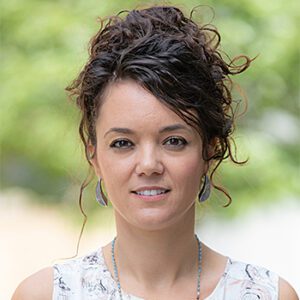
Eranda Nikolla, professor of chemical engineering and macromolecular science and engineering, joined the University of Michigan in 2022. As the head of the Nikolla Lab, she leads research focused on heterogeneous catalysis, primarily thermal and electro-catalysis, for energy and chemical conversion and storage, such as fuel cells, electrolyzers, batteries, cooperative/selective heterogeneous catalysis for biomass conversion and chemical recycling of plastic waste and carbon dioxide. Her research addresses these issues by combining state-of-the-art synthesis techniques, characterization, including electron microscopy and spectroscopy and quantum density functional theory chemical calculations.
Nikolla’s career in engineering was sparked by a strong passion for science and math, recognized early in high school when she became the first female student to receive the highest award in science. This milestone reinforced her commitment to STEM. As an engineering undergraduate and graduate student in Michigan, the epicenter of the automotive industry, she was inspired to pursue research in developing energy-efficient fuel conversion systems, reducing pollution and decreasing our reliance on fossil fuels.
Nikolla’s research focuses on heterogeneous catalysis, a scientific field that plays a critical role toward the development of a sustainable and renewable future energy platform to address the contemporary challenges associated with dwindling fossil fuel resources and high CO2 emissions. Over the years, her research group has contributed greatly to the development of efficient catalysts/electrocatalysts for applications to energy and chemical conversion processes.
Her research areas related to MI Hydrogen involve designing non-precious metal-based catalysts for electrochemical reactions that generate H2 from water through electrolysis. Her group investigates the reactivity and dynamic behavior of these catalysts under electrochemical conditions to establish structure-activity-stability relationships, which guide them in designing optimal, active, stable and cost-effective catalysts for these electrochemical transformations. Additionally, considerable effort in her group has focused on utilizing H2 for upgrading CO2 and plastic waste, as well as effectively using it as fuel in electrochemical energy generation.
“As scientists and engineers, we have a responsibility to develop solutions to overcome the limitations of the current energy landscape and shape the future of society through research and the development of new methods for sustainably converting and storing energy,” said Nikolla. “Hydrogen will undoubtedly be part of these solutions and play a crucial role in building a sustainable and renewable energy future.”
Topical Areas of Interest: Renewable Production, Catalysis for Energy and Chemical Conversion and Storage, Fuel Cells, Electrolyzers, Batteries, Selective Heterogeneous Catalysis for Biomass Conversion, Chemical Recycling of Plastic Waste and Mitigation of Greenhouse Gasses
| Nikolla holds a BS in Engineering Chemistry from Oakland University (2003), an MSE in Chemical Engineering (2004) and a PhD in Chemical Engineering (2009) from the University of Michigan. She is a member of the Editorial Advisory Board for the Journal of American Chemical Society and serves as the Editor of the Journal of Catalysis. She received the ACS Catalysis Lectureship for the Advancement of Catalytic Science from the ACS Division of Catalysis Science & Technology and the ACS Publications journal ACS Catalysis (2022), as well as the Excellence in Catalysis Award from the Catalysis Society of Metropolitan New York (2024). She was also recognized with the Camille Dreyfus Teacher-Scholar Award (2016-2021), the Department of Energy Early Career Research Award from the Office of Basic Energy Science (2015), and the National Science Foundation Faculty Early Career Development (CAREER) Award (2014). Additionally, she was featured in Cell Press’s “50 Scientists that Inspire” (2024). |
Nirala Singh: Electrocatalysis and Catalysis, Hydrogen Evolution, Photoelectrochemical Water Splitting, Hydrogenation, Production Renewable Fossil, Storage Ammonia and Liquid Organic Hydrogen and Fuel Cells

Nirala Singh, an alumnus of the University of Michigan, returned to his alma mater as an assistant professor in 2018 after completing his PhD from the University of California, Santa Barbara. He is currently an associate professor in the chemical engineering department. Singh is actively involved with the Michigan Catalysis Society, serving as president in 2023-2024, which promotes advances in the science of catalysis. His research with MI Hydrogen centers on energy storage and production. His projects predominantly involve the production of hydrogen from water using renewable electricity, as well as the utilization and chemical conversion of hydrogen for various applications.
Singh’s research spans three key areas, the first being energy storage. With a strong push toward decarbonizing the electric grid, the integration of renewable energy sources like solar and wind is essential. These sources, while abundant, are inherently intermittent. Therefore, storing energy for use during periods when the sun is not shining, or the wind is not blowing is crucial. Currently renewables account for about 20% of our energy production and increasing that percentage presents challenges. Therefore, Singh’s research aims to discover cost-effective electrochemical solutions to store electricity for future use, with projects exploring the potential of redox flow batteries.
The second area of Singh’s research focuses on developing more sustainable methods for producing fuels and chemicals. This typically involves using electricity to create liquid hydrocarbon fuels, using carbon dioxide or biomass as a feedstock. These technologies enable the use of renewable electricity to transform basic molecules into energy-rich fuels. By storing energy within chemical bonds, these fuels can be used flexibly and efficiently where and when needed. A key component of this work is the electrolysis of water. Singh’s team develops catalysts and reactors that efficiently use electricity to split water into hydrogen and oxygen, capturing energy within chemical bonds with minimal energy loss. Additionally, Singh collaborates with industrial partners to harness sunlight as a direct energy source for hydrogen production.
The shipment and storage of hydrogen present significant challenges. Singh’s research includes projects aimed at developing methods to bond hydrogen with other molecules, such as forming carbon-hydrogen bonds, to create stable and transportable forms of energy. This approach not only decentralizes the production of conventional fuels like gasoline but also involves alternative conversions with ammonia and carbon species. Addressing these challenges is critical to leveraging hydrogen as a fuel and integrating it into the broader energy system at the scales necessary for meaningful decarbonization.
Singh’s work delves into the molecular understanding of hydrogen. By studying how hydrogen bonds form and break, often on solid surfaces, his team aims to improve the efficiency of hydrogen production and utilization. This research is crucial for scaling hydrogen technologies and ensuring efficient energy transfer and storage.
The final area of Singh’s research involves the remediation of wastewater. This work is crucial for achieving environmental sustainability and involves developing advanced electrochemical processes to effectively treat waste streams. By focusing on reducing harmful compounds and improving water quality, Singh’s team works on creating technologies that align with the broader goal of transitioning to energy solutions that are powered by renewable rather than fossil fuels. This research supports the development of future technologies aimed at combating climate change and minimizing the environmental impact of industrial activities.
“I think it’s great,” Singh said, reflecting on the opportunity to return to U-M to conduct research in new energy technologies and the potential of hydrogen. “The science and technology of understanding these things is really important, and it’s going to be key to whether we can make this kind of transition,” Singh explains. “I’m very happy that students, especially in chemical engineering, are coming in excited and motivated to work on these problems. Talking to groups like the clean energy club shows they’re not only interested but understand the need for solutions. It felt like these issues were far away when I was a grad student, but the need for this work feels increasingly urgent today.”
Topical Areas of Interest: Electrocatalysis and Catalysis, Hydrogen Evolution, Photoelectrochemical Water Splitting, Hydrogenation, Production Renewable Fossil, Storage Ammonia and Liquid Organic Hydrogen and Fuel Cells
| Nirala Singh holds a BSE (2009) in Chemical Engineering from the University of Michigan and a PhD (2015) in Chemical Engineering from the University of California Santa Barbara. He was awarded the NSF CAREER Award, the Washington Research Foundation Innovation Fellowship-University of Washington (2016-2018), the Air Products and Chemicals Fellowship-UC-Santa Barbara (2013), the ConvEne IGERT Fellowship-UC-Santa Barbara (2011), the Heslin Fellowship-UC-Santa Barbara (2010) and was a James B. Angell Scholar-University of Michigan (2009). |
Tim Wallington: Life Cycle Assessments, Electric Vehicles, Climate Change, Atmospheric Chemistry
 Tim Wallington joined the University of Michigan Center for Sustainable Systems (CSS) in the School for Environment and Sustainability in 2023 after 35 years at the Ford Motor Company, where he led the Environmental Science Group.
Tim Wallington joined the University of Michigan Center for Sustainable Systems (CSS) in the School for Environment and Sustainability in 2023 after 35 years at the Ford Motor Company, where he led the Environmental Science Group.
Wallington’s research interests at CSS focus on the use of life cycle assessments to examine the sustainability of global transportation, including energy use and emissions, air quality and climate change impacts, and material availability and flows. His work within MI Hydrogen is aimed at addressing the question of where hydrogen might be used to power future sustainable ground, water and air transportation either directly, or indirectly in synthetic fuels.
“This is a complex question which needs a systems thinking approach,” said Wallington. “We must ask where the hydrogen comes from and what environmental and social impacts and financial costs are associated with obtaining it, distributing it and using it in transportation. At the point of use in a fuel cell, hydrogen only emits water and so it has zero impact. However there may be substantial impacts upstream of the point of use.”
In his research, Wallington stresses the importance of each of the three pillars of sustainability: environmental, social and economic. For hydrogen to play a future role in transportation it will need to be not only environmentally and socially acceptable, but also economically viable.
“It is hard to overstate the importance of the recent economic policy support for hydrogen”, he noted. New policies have been enacted in the U.S. and EU to incentivize the production of clean hydrogen, providing generous financial support for clean hydrogen production over the next decade and an opportunity for the decarbonization of transportation sectors such as heavy-duty road, marine and aviation that are hard to electrify.
Originally from Northampton, England, Wallington came to the United States to conduct postgraduate research at the University of California-Riverside Statewide Air Pollution Research Center in 1984.
In 1986, he moved to the National Institute of Standards and Technology in Washington, D.C. before joining the Scientific Research Laboratories at Ford Motor Company in 1987. Wallington’s early experiences with environmental sciences opened his eyes to the opportunities in the field.
“Given its benefits in terms of lower emissions and the generous financial policy support available there’s a lot of interest in the use of hydrogen as a future transportation fuel,” said Wallington. “The MI Hydrogen team is working to understand just how that future might evolve.”
Topical Areas of Interest: Life cycle assessments, hydrogen, electric vehicles, climate change, atmospheric chemistry
| Wallington holds a B.A. (Chemistry, 1981), Ph.D. (Atmospheric Chemistry ,1983), and D.Sc. (Atmospheric Chemistry, 2007) from Oxford University. He holds an M.B.A. from the University of Michigan (2003) and was awarded an honorary D.Sc. from Copenhagen University (2006) by Queen Margrethe II of Denmark. Wallington is a Fellow of the Royal Society of Chemistry and was President of the Physical and Biophysical Chemistry Division of the International Union of Pure and Applied Chemistry (2020-21). He is member of the U.S. EPA Board of Scientific Counselors and the Clean Air Act Advisory Committee. He has coauthored 560 peer-reviewed scientific publications, 26 book chapters, and 7 books on vehicle emissions, atmospheric chemistry, environmental impacts, and lifecycle assessments and has an H-index of 80. |
Advisory Board

Michigan Economic Development Corporation
Kathy Ayers
Nel Hydrogen
Jean Baderschneider
Fortescue
Justin Edmiston
DTE Energy
Amgad Elgowainy
Argonne National Laboratory
CMS Energy
Shyam Jade
Bosch North America
Zachary Kolodin
Michigan Infrastructure Office
Chris Kondogani
Noble Gas Systems
General Motors
Reuben Sarkar
American Center for Mobility
Timothy Slusser
City of Detroit
Levi Thompson
University of Delaware
Research Projects
Project 1: Demand Analysis
State of Michigan hydrogen demand analysis: current (2022), near-term (2030), and long-term (2050)
Center for Sustainable Systems | Jul 1, 2024
Ann Arbor, MI: The Center for Sustainable Systems (CSS) at the University of Michigan today published a technical report estimating future hydrogen demand in Michigan’s industrial and transportation sectors. The report, entitled “State of Michigan Hydrogen Demand Analysis: Current (2022), Near-term (2030), and Long-term (2050),” is the final product of a capstone project by six graduate students in the School for Environment and Sustainability. The capstone project, advised by Dr. Gregory A. Keoleian, co-director of CSS and the University’s MI Hydrogen Initiative, examined current and potential future demand for hydrogen across Michigan in hard-to-abate industrial end-uses including petroleum refining, chemicals, pulp and paper, steelmaking, cement, glass, semiconductor manufacturing, as well as in medium- and heavy-duty vehicles (MHDV). The reduction in greenhouse gas (GHG) and nitrogen oxide emissions associated with hydrogen deployment were also calculated. Hydrogen demand estimates are intended to inform the planning of a regional hydrogen ecosystem (linking production, distribution, and end uses) by identifying potential nodes of hydrogen use in key sectors in Michigan.
The research team collaborated with stakeholders throughout the state of Michigan to inform the analytical approach and collect primary data. If data were proprietary or unavailable, the research team utilized diverse sources, including decarbonization roadmaps, U.S. Department of Energy (DOE) reports, and federal datasets to fill data gaps. The team developed novel research methods to estimate fuel demand in industrial facilities from reported emissions and for MHDVs from vehicle-miles traveled, and used DOE’s Greenhouse gases, Regulated Emissions, and Energy use in Technologies (GREET) model to estimate emissions reductions associated with switching from incumbent fuels to hydrogen, considering upstream production emissions, combustion emissions, and hydrogen production pathways.
Highlights from the technical report include:
- Current (2022) demand was estimated at approximately 39,100 metric tons of hydrogen per year;
- In the near term (2030), hydrogen demand could grow by as much as 60% driven by new opportunities in steelmaking and expansion in MHDV use;
- In the long-term (2050), hydrogen demand could grow between 420% to 2,700%, depending on costs, infrastructure, and scaling of production;
- If produced through polymer electrolyte membrane (PEM) electrolysis with renewable electricity, these demand growth scenarios could reduce GHG emissions by 20% or more.
Access the report here: https://css.umich.edu/publications/research-publications/state-michigan-hydrogen-demand-analysis-current-2022-near-term
This project was supported by the School for Environment and Sustainability (SEAS) and the MI Hydrogen Initiative.
Project 2: Transportation Sector Analysis
Project 3: Industrial Sector Analysis
Project 4: Hydrogen Ecosystem Planning
Planning a Hydrogen Ecosystem (Production, Delivery, Storage and End- Use Applications): Michigan/Great Lakes Region Case Analysis.

The 2025 International Symposium on Sustainable Systems and Technology Student Poster Competition. From Left to Right: Papa Yaw Owusu-Obeng, Prof. Shelie Miller, Spencer Checkoway and Rohit Kumar Salotra
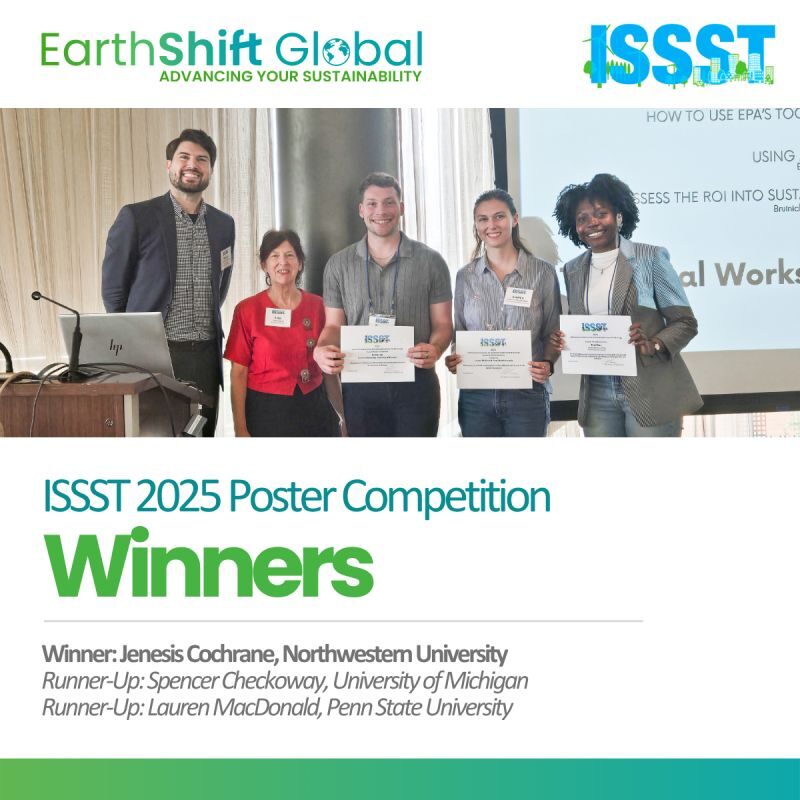
Congratulations to Spencer Checkoway from the University of Michigan for earning Runner-Up in the ISSST EarthShift Global Advancing Sustainability 2025 Poster Competition!
Identifying the best power sector pathways in India
SEAS students explore green hydrogen applications in India
US Association for Energy Economics (USAEE conference Nov 16-19, 2025 Fort Worth TX)

Partnerships & Connections






